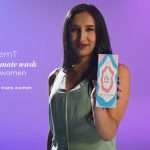By Mark Tungate
We talk to Wunderman Thompson Belgium ECD Manual Ostyn about the edgy app that won the Digital Grand Prix at the Epica Awards.
Have you ever sent an intimate or erotic photo of yourself via your mobile phone? Don’t be ashamed: politicians seem to do it all the time! Whether you have or not, “sexting” exists. You’d imagine that a major telecom provider might want to tiptoe around such a tricky subject – but not Belgium’s Telenet, which waded right into the debate with an app that enables safe “sexting”.
By protecting the identity of the sender and highlighting that of the recipient, the app prevents another social malaise: “sextorsion”, or the threat of spreading the image far and wide.
The “.comdom” app and the accompanying campaign were created by Wunderman Thompson Belgium. So how did the agency convince Telenet to embrace such a controversial aspect of social media?
Manuel Ostyn, executive creative director at the agency, explains: “Telenet has been a client for a long time – actually 12 and a half years, long before I joined six years ago – so I think the build-up of successful creative campaigns over the years led to this step.
But the campaign is part of a much larger social content programme we created to confirm Telenet’s leadership position in the Belgian market. Rather than shouting about their products, the idea was that as the market leader in telecoms they should take responsibility for what their products make possible.”
The agency and the brand created #TelenetGo, a platform encouraging debate about the more problematical sides of social media, including “sharenting” – over-sharing pictures of your kids – and “phubbing” – ignoring your loved ones in favour of your phone. “Sexting” was identified as one of these darker aspects.

Damage limitation
“Faster internet and so on is a given – Telenet doesn’t need to talk about that anymore, as everyone knows it. The #TelenetGo programme went a step further, by stating that leadership is also about taking a stance on difficult issues.”
Sexting was considered the most edgy subject, but it was difficult to ignore. “People have been sending these images ever since there have been cameras,” Manuel points out. “And even before that, as drawings or paintings. It seems to be part of human nature. It’s when the images are used for ‘sextorsion’ that the situation becomes criminal. And in the super fast age of social media, a lot of damage can be done very quickly.”
There was some debate both within the agency and with the client about whether the app could be perceived as encouraging sexting and have a negative impact on the brand.
“But we felt that it could be done with the right educational tone and the right nuances. For example, among the tips we implemented within the app – how to hide your face and so on – we remind users: ‘You don’t have to do this, it’s your decision, so don’t feel pushed into it.’ And we launched a social campaign explaining sexting: what it is and why we want to protect people, with the help of experts.”
The initiative received the endorsement of Child Focus, an organisation tackling the challenges of missing and sexually exploited children (adolescents are among the most concerned by sexting). “They shared the same mindset as us and not only supported the launch of the app, but also joined the conversation around the subject. We were not saying, ‘sexting is cool, you should try it’, but that sexting is out there, people do it, so we should try to make it as safe as possible.”
Wunderman Thompson’s in-house digital team designed the content, functionality and flow of the app, while external developer AppFoundry brought it to life.
“The reaction was immediately positive,” says Manuel. “All the Belgian media covered it, which was great because it’s not easy here to get coverage with a campaign for a commercial brand. But because of the edgy topic and the risk everyone felt Telenet was taking, it attracted a lot of attention from the press and television.”
Having anticipated curiosity about the subject, the agency had recorded a number of Smart Talks with experts, which were made available for free online, including on Telenet’s video-on-demand platform. (The talks cover other “darker” aspects of social media too.)
Meanwhile, an educational social media campaign ended in a call to action with the opportunity to download the app. It was widely adopted and the reaction across social media was overwhelmingly positive. The app is still popular a year on.
Manuel concludes: “Although we put everything in place so that this felt safe to do, without the possibility of a backlash, it was really only possible thanks the sincere conviction of the team at Telenet that market leaders should accept their responsibilities.”
MARKETING Magazine is not responsible for the content of external sites.









